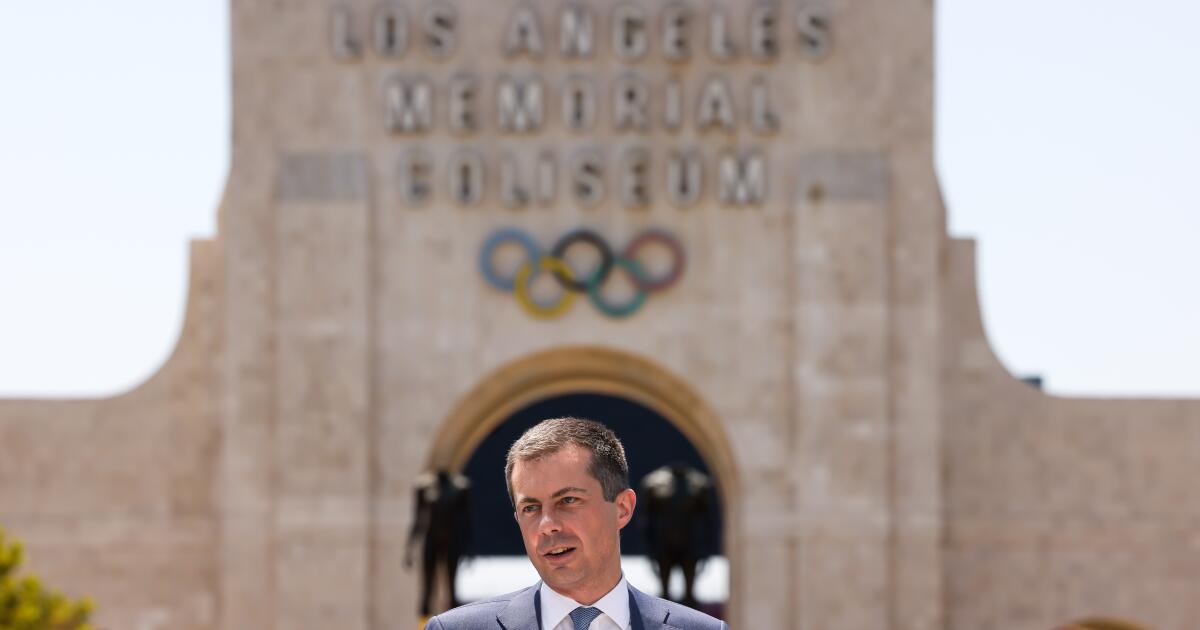Standing in front of the Los Angeles Coliseum’s famous peristyle, site of the opening ceremonies of the 1984 Olympics, Transportation Secretary Pete Buttigieg on Thursday touted a $77 million injection of funding to pay for more electric subway buses.
The buses will help ferry tens of thousands of fans around the city during an Olympics billed as “transit first,” and are one of thousands of details officials must sort out before Los Angeles can host the games in 2028. The influx of funds will support the Metropolitan Transportation Authority’s larger effort to make more than 2,000 buses all-electric by 2030.
“Los Angeles residents and Olympians are going to see just how efficient public transportation is in our region. This is an investment in the future,” Buttigieg said, flanked by Mayor Karen Bass, LA28 Chairman Casey Wasserman and other officials excited about the Paris Olympics, which are set to begin this month, as the countdown began in Los Angeles.
The MTA aims to acquire battery-electric buses, charging equipment and supporting infrastructure to operate reliable, zero-emission service across multiple cities in Los Angeles County.
Buttigieg spent the day riding subways, trains and buses in Los Angeles, touting the money the region received as part of the Biden administration’s $1 trillion infrastructure bill, which has pumped millions into Metro’s expanded rail system and ports and launched new projects. But with the Paris Games just days away, most Los Angeles officials were preoccupied with the 2028 Olympics.
More than a million people are expected to visit the Los Angeles area during the 17-day Olympics, and organizers hope people will get there by public transportation, on foot, or by bike. That would be quite a feat in a sprawling metropolis known for its congested freeways. So local leaders used the Olympics to add urgency to their wish list, which includes deploying electric buses. The strategy has raised some money, but it won’t solve the logistical challenges of moving so many tourists every day.
Metro has requested an additional $319 million from the Biden administration in next year’s budget to cover Olympics-related costs, including $45 million to plan and design an auxiliary bus system to transport fans to venues and $14 million to design routes for athletes and other VIPs.
Buttigieg said he “can’t get ahead of the White House,” but noted the Justice Department has been providing technical assistance to lawmakers considering how to fund the Olympics.
But no guarantees have been made yet. Mayor Bass, who is heading to Paris next week for the Olympics, said he is confident that President Biden, who is facing a tough election campaign, will support Los Angeles.
“The White House has been supportive from day one,” she said Thursday on the lawn outside the Coliseum. “They have a staff that is focused on the Olympics, and we’re in constant contact. It’s very encouraging.”
When Mayor Eric Garcetti won the bid to host the 1928 Olympics, he pitched it to residents as a landmark event that would generate millions of dollars in revenue, not a burden on taxpayers. But transportation has proven difficult: Doubling the number of buses to make it easier for fans to get around the city by public transportation is estimated to cost more than $1 billion.
And buses purchased with federal subsidies won’t help the agency expand its fleet or reach its goal of going electric, as there are too many obstacles to overcome, including a lack of chargers and a dwindling number of manufacturers able to build electric buses.
For now, Bass and many of the remaining members of the Metro board, including the board of supervisors, plan to travel to Paris to see how the city will handle the Olympics and Paralympics.
And when it comes to fundraising, they’re taking a wait-and-see approach.
Supervisor Janice Hahn, who chairs the incoming Metro Executive Committee, said she and Bass made their pitch to Buttigieg while riding the B Line on Thursday, emphasizing that the federal government should help with the Olympics.
“We wanted to make the point that we shouldn’t have to do it alone,” she said. “We have access to federal funding.”
City News Service contributed to this report.

